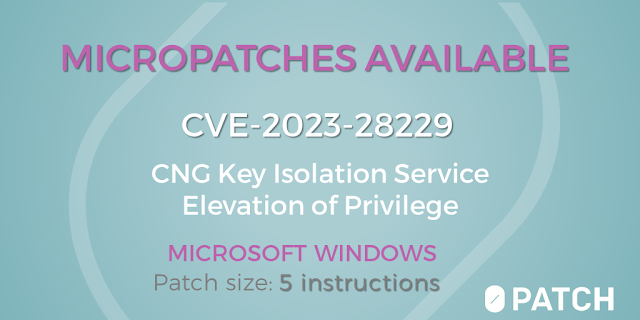Last month, security researcher @k0shl of Cyber Kunlun published a proof-of-concept for CVE-2023-28229, an elevation of privilege vulnerability in CNG Key Isolation Service. The same POC also demonstrated exploitation of CVE-2023-36906, an information disclosure vulnerability in the same service discovered by the same researcher.
Microsoft had previously provided fixes for these issues in April and August 2023, respectively. According to CISA, CVE-2023-28229 was found to be exploited in the wild.
CVE-2023-28229
This bug is a race condition in the Key Isolation service running in lsass.exe that allows an attacker to use already-freed memory inside a structure. Its root cause is flawed critical section management that protects heap-based data structures from concurrent access but for some reason excludes reference counter initializations and updates. When a user spawns many concurrent threads that call SrvCryptCreatePersistedKey and SrvCryptFreeKey, these threads eventually cause the execution of said functions such that a key data structure is freed in one thread but then still used in another thread by calling the structure destructor method from already deallocated vftable.
Microsoft patched this bug in April 2023, and their patch included relocating several critical sections over various pieces of code. Our approach to patching this issue was more minimalistic as we only switched two instructions to place the increasing of the reference counter in function SrvAddKeyToList inside the critical section. It was our assessment that this very instruction was the most critical enabler of exploitability.
During the analysis, we also noticed that this bug doesn't affect Windows 7 and Server 2008 R2 systems as the relevant code in keyiso.dll is completely different there and does not use critical sections in the same way as in newer versions of Windows.
Source code of our patch:
MODULE_PATH "..\AffectedModules\keyiso.dll_10.0.19041.388_Win10-2004_64-bit_u2021-12\keyiso.dll"
PATCH_ID 1509
PATCH_FORMAT_VER 2
VULN_ID 7723
PLATFORM win64
patchlet_start
PATCHLET_ID 1
PATCHLET_TYPE 2
PATCHLET_OFFSET 0x2d2f
N_ORIGINALBYTES 5
JUMPOVERBYTES 16 ; remove these two instructions
PIT ntdll.dll!RtlLeaveCriticalSection
code_start
lock inc dword[rdi+0x8] ; and re-add them in the reverse order
call PIT_RtlLeaveCriticalSection
code_end
patchlet_end
CVE-2023-36906
This information disclosure issue stems from the way the Key Isolation Service implements SetProviderProperty and GetProviderProperty functions. When calling SetProviderProperty, the attacker can specify a string of some length, but can then request its value using GetProviderProperty specifying a larger length.When this happens, the Key Isolation Service reads the referenced buffer without any additional checks and reveals the content of memory beyond the designated buffer. This allowed the POC to obtain an internal object address, which it can then use to exploit CVE-2023-28229 in a more reliable way.
Microsoft's patch for this issue added a forced zero-termination of the user-supplied string such that subsequent reading from the buffer could not extract information beyond the bounds of the buffer.
We chose a similar but more minimalistic approach by setting the HEAP_ZERO_MEMORY flag to the RtlAllocateHeap call, causing the allocated space to be initialized with zeroes.
MODULE_PATH "..\AffectedModules\ncryptprov.dll_10.0.19041.2193_Win10-21H1_64-bit_u2022-12\ncryptprov.dll"
PATCH_ID 1519
PATCH_FORMAT_VER 2
VULN_ID 7795
PLATFORM win64
patchlet_start
PATCHLET_ID 1
PATCHLET_TYPE 2
PATCHLET_OFFSET 0x6bf6
N_ORIGINALBYTES 5
JUMPOVERBYTES 0
code_start
add r8, 0x2 ; increase the size of the allocated buffer
mov edx, 0x8 ; set the HEAP_ZERO_MEMORY flag for the upcoming
; RtlAllocateHeap call
code_end
patchlet_end
Micropatch Availability
Micropatches were written for the following security-adopted versions of Windows with all available Windows Updates installed:
- Windows 10 v21H1
- Windows 10 v20H2
- Windows 10 v2004
- Windows 10 v1909
- Windows 10 v1809
- Windows 10 v1803
Vulnerabilities like this one get discovered on a regular basis, and
attackers know about them all. If you're using Windows that aren't
receiving official security updates anymore, 0patch will make sure these
vulnerabilities won't be exploited on your computers - and you won't
even have to know or care about these things.
If you're new to 0patch, create a free account in 0patch Central, then install and register 0patch Agent from 0patch.com, and email sales@0patch.com for a trial. Everything else will happen automatically. No computer reboot will be needed.
We would like to thank @k0shl of Cyber Kunlun for sharing their proof of concept, which made it possible for us to create a
micropatch for this issue.

No comments:
Post a Comment